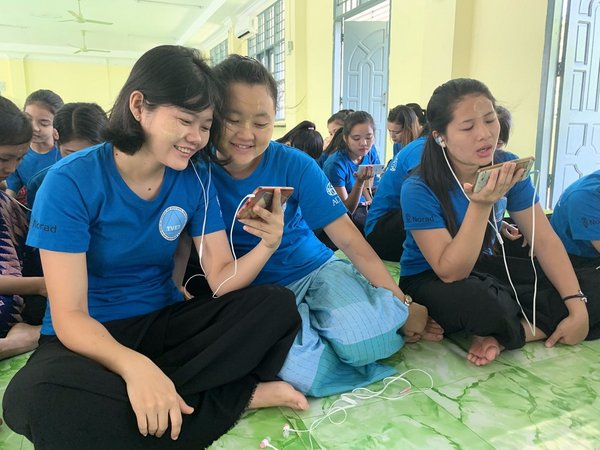 Read this article in French
Read this article in French- Share this article
- Subscribe to our newsletter
Improving access to vocational education through digital learning
Among the winners of this two-day Hackathon was for example a team from Madagascar, which developed a hotline, where citizens can get information on COVID-19 through pre-recorded messages. Another team from Peru developed a cloud-based matchmaking platform to solve shortages of material supplies in the health care system.
Together with its technical partner Zabai, Helvetas developed a digital solution for the challenge of disrupted vocational education in Bangladesh and Myanmar. The fact that they were not among the winning teams didn’t prevent them from pursuing their objective to support youth to continue education during the pandemic. Digital training courses for motorcycle mechanic and fashion tailors are underway for the returnee women and men who were pushed out of employment in big cities due to factory closure during COVID-19.
The overlooked victim of COVID-19: youth
The worldwide COVID-19 crisis led to the closure of schools, hindering education around the globe. According to UNESCO, in March 2020 over 165 countries had closed schools, universities and technical training facilities. Worldwide, over 1.5 billion children and youth were affected by the closure of educational institutions, which is around 87 per cent of enrolled students. In Myanmar, TVET institutions are still closed eight months after the outbreak of the pandemic. Youth is hit hardest by the educational and economic disruptions caused by the crisis, and at risk of losing their jobs. On top of economic concerns, youth often suffer from psycho-social stress.
Myo San Aung, Skills Advisor of Helvetas Myanmar, explains: “Youth face many challenges beyond their control, such as youth unemployment. The current COVID-19 situation drive youth even more into helpless situations.”
Access to high quality vocational education through digital learning
Already before the pandemic, Helvetas recognised the enormous potential of digital learning. Thanks to digital learning, Helvetas aims at improving the quality of education through student centred and personalised learning and reaching a broader audience at a lower cost. Myo San Aung says “covering digital learning in Myanmar is still a new idea and the capacity of educational institutions needs to be developed. Another challenge is connectivity. While youth in semi-urban areas have access to mobile phones and internet, many youth in rural areas and politically instable places are confronted with frequent internet shutdowns. This is why Helvetas and Zabai apply a solution, which also works offline.”
Helvetas is currently digitising three curricula together with Zabai (motorcycle repair, beauty, tailoring) and applies a blended learning approach, which is combining digital and practical learning. The courses use a broad mix of tools (e.g. videos, animations, quiz) to increase attractiveness and motivation of learners. Besides technical courses, trainees can also participate in additional digital courses, such as life skills, financial literacy or entrepreneurship, which support their transition to the labour market or prepare them for self-employment.
All courses are embedded in an integrated Learning Management System (LMS) offering different functionalities to organise digital training. Furthermore, teachers/trainers will be trained on new digital facilitation skills to support trainees throughout the learning process. The project is funded by contributions from several foundations as well as the Swiss Agency for Development and Cooperation (SDC) and the Swiss Solidarity (Schweizer Glückskette).
A Win-Win partnership thanks to the Hackathon
The #SmartDevelopmentHack allowed development organisations like Helvetas to strengthen cooperation with innovative technical enterprises to find new solutions for development challenges. Helvetas brings expertise in skills development and employment promotion and Zabai in the field of digitalisation and innovation. The inspiring experience of the Hackathon and the ideas developed during these two days were the beginning for joint initiatives to support education and employment of thousands of youth, starting in Myanmar.
Ivar Viktil, Managing Director of Zabai says: “For us as an e-learning provider, it is encouraging to see the increased interest of e-learning by Helvetas and other NGOs. The three e-learning courses we are developing together in Myanmar can be translated into other ethnic languages in Myanmar to reach more students. But the potential for scaling up does not stop there. We already have examples of digital courses developed for Myanmar that have been translated and used in African countries. Hopefully, we can work with Helvetas to translate and use their courses in other developing countries.”
Despite the devastating effects on local economies, many Helvetas projects try to see the crisis as a window of opportunity to accelerate innovation. The digital economy is transforming jobs worldwide, making 21st century skills essential. Digital learning offers an opportunity for youth to directly apply these skills and better respond to new labour-market demands.
(Helvetas/wi)
More information: #SmartDevelopmentHack





Add a comment
Be the First to Comment